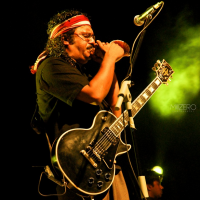Zero Degree Atoll

Zero Degree Atoll formed in 1987 with childhood friends Nashid and Mohoj collaborating with fellow music aficionado Ahmed. Their debut song Reethi Handhuvaru – about the natural beauty and serenity of the Maldives – was produced together with Worldview International Foundation and the Ministry of Home Affairs of the Maldives. The video for the song was shown on Television Maldives to raise environmental awareness among locals and the band gained national recognition. The trio then embarked on a musical journey of discovery and experimentation that would result in them being linked by a strong bond lasting to this day.
In 1988, the band began to work on their first album, travelling across the Maldivian isles and living with local communities while immersing themselves in island culture. They recorded various soundbites that made up the natural rhythms of laid-back atoll lifestyles. These soundbites paid tribute to the traditional and cultural distinctiveness in local routines like the cadent clinging of oars on water and the swishing of winnowing rice. These were then interspliced into the band’s music resulting in an album that rang with early morning birdcalls, the thumping of coconut husks and the dancing of waves ashore.
The very essence of Zero Degree Atoll’s inherent national charm lay in their encompassment of traditional poetry and archaic chants as well as the inclusion of the locally esteemed bodu beru – literally meaning big drum – in their songs. The attention garnered to the complex nuances of the mother tongue has led to the band being one of the most sought-after live acts on local terrain, as well a vastly popular act for visiting international audiences.
Live and loud
From its conception, the band went on to make a number of appearances on the international arena in addition to their countless performances on national stages. In 1991, they performed in Switzerland on an invitation by the country to mark its 700th year of Independence. In 1992, a concert was held in Male’ to mark the release of Dhoni album. The show was an undeniable musical sensation. They represented the Maldives thrice at the International Tourism Fair (ITB) in Berlin, in 1993, 1995 and 1997. In August 1996, the band signed up with a French recording company for the professional production of the songs in Dhoni Album. Recorded at the Couleur Studio in France, the Album Island Pulse was a more westernised version of Dhoni with more guitars, more drums and more versatility. This album was marketed in Europe and in the Maldives, focusing particularly on spreading island music to the tourists arriving to the country In September 2000, the band performed at the Sun Club in D’uville in France In March 2004, Zero Degree Atoll performed in Male’ as a part of the ‘One World Beat’ Global Music Festival to help children living with HIV/Aids.
The fruit…
Zero Degree Atoll continues to tour the region, bringing their distinctive music to their stronghold, the fan-base which has been loyally supporting them throughout the twenty years of its existence. The band’s popularity is upheld by generations of Maldivians who find the music just as inspirational, innovative and influential as they did twenty years ago.
On 18 May 2007, on the Northeastern beach of Male’ the capital of the Maldives, the island gathered to witness a spectacle: with wide eyes, raised hands and craving ears, the audience experienced the band onstage at their latest appearance, at the show ‘The Sound of a Nation’. From the band’s upbeat performance onstage, the audience echoed the lyrics down below. Like archaic mythical stories passed down for generations, Zero Degree Atoll’s music had become unmistakably legendary.
Since its conception in the late eighties where the island rhythms and sounds were commonplace among the locals, the band has evidently come a long way. The environment has changed, the sounds that once inspired the band’s early music have disappeared. Engines have replaced oars, sound of the traffic has replaced the shushing of the waves. The island now pulses to a different beat. What lives on is the music that once had the ingenious insight of encapsulating those sounds of what the nation once was, and because of the timelessness of their songs, that it will always be.